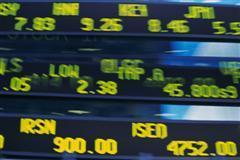| Home | About | Archives | RSS Feed |

The Independent Investor: Oil Hits My Price Target
 If there is one thing I've learned in forecasting commodity prices, you have to be disciplined. Here in the U.S. our benchmark crude for April delivery hit an overnight high of $103.41 in electronic trading. It's time to sell.
If there is one thing I've learned in forecasting commodity prices, you have to be disciplined. Here in the U.S. our benchmark crude for April delivery hit an overnight high of $103.41 in electronic trading. It's time to sell.
One-hundred-dollar oil has been my target now for well over a year. It is an interim price target because I still believe that over the long term (over the next few years) we will see the price of oil much higher. But for now this rally is on its last legs.
"How can you say that?" demanded one client who just recently jumped on the oil bandwagon. "Don't you read the news? The Middle East is coming apart. The world's oil supplies are in jeopardy."
That is the kind of sentiment that makes me feel even more confident that it is time to take profits. Sure, there are pressing issues over in oil land and I don't deny that there will be additional turmoil before all is said and done. However, I do not believe that the world's oil supply is in jeopardy.
Keep in mind that Libya produces less than 2 percent of the world's oil. Its "King of Kings" (as Moammar Gadhafi likes to be called these days), is in my opinion, a certifiable madman and his ultimate demise would be cause to celebrate. However, that may take some time to engineer and in the meantime oil will most likely stay at these nose-bleed levels. Ultimately, when the crisis has passed, we will once again be back to a global economy that is growing slowly and definitely not at a pace that justifies such high price levels for energy.
This temporary spike in oil is great news for the media. It has spawned an entirely new "what if" series of gloom and doom economic scenarios, which in turn has driven the stock markets down 3 percent.
"Auto sales will be decimated," says one talking head.
"Four-dollar gas is round the corner," predicts a young gas station attendant solemnly.
"The economy will be thrown back into a recession," says an economist, still smarting from his conviction that we would experience a double-dip recession in 2010.
"The consumer will be crushed."
"Restaurants will close."
"It's the end of the world." (My quote).
Those kinds of statements will certainly sell newspapers or keep you tuned into CNBC, but beyond their entertainment value, I see no point in listening to these Doctor Dooms.
Folks, my advice is to keep this present state of affairs in perspective. We were badly in need of a market correction. Now, we have it, thanks to the Middle East.
A month from now when this blows over and the price of oil is considerably lower than today you will be wishing you did two things: 1) took advantage of lower stock prices and 2) sold oil, if you owned it.
Bill Schmick is an independent investor with Berkshire Money Management. (See "About" for more information.) None of the information presented in any of these articles is intended to be and should not be construed as an endorsement of BMM or a solicitation to become a client of BMM. The reader should not assume that any strategies, or specific investments discussed are employed, bought, sold or held by BMM. Direct your inquiries to Bill at 1-888-232-6072 (toll free) or e-mail him at wschmick@fairpoint.net. Visit www.afewdollarsmore.com for more of Bill's insights.
| Tags: oil |
@theMarket: 707 Days
 It's official: the S&P 500 Index is now up 100 percent from its low of 666.79 back in March 2009. It was the fastest double in stock prices since 1936. And it is not over.
It's official: the S&P 500 Index is now up 100 percent from its low of 666.79 back in March 2009. It was the fastest double in stock prices since 1936. And it is not over.
I have suggested several times in past columns past that a big move in stocks would come when individual investors sold their bond holdings, gathered their courage, and returned to the stock market. That time may be upon us.
Consider that this is the fifth week in a row that inflows into domestic stock funds have increased. A total of $21.3 billion moved into equity mutual funds in January. The first week in February saw an additional $5.85 billion and last week another $9.3 billion flowed into equities.
The money is coming out of bond funds (mainly funds invested in U.S. Treasuries and Munis). As expected, the stock markets' five-month winning streak and low rates of return in the government bond markets and money markets are forcing investors back into equities. This has been my premise for well over a year.
Corporate profits are approaching record levels. The economy is gaining steam, inflation forecasts remain subdued (2-3 percent/year) and interest rates are historically low. That is what I call a "sweet spot" for making money in stocks. But the market's steady rise since the beginning of the year, with little to no corrections, has also confounded veteran market watchers. Some respected technical analysts I know have actually given up trying to predict the timing of a pullback. The truth is that a correction can happen at anytime, but so what. Buy the dip.
Consider that the U.S. market continues to rise in the face of tensions in the Middle East, soaring global commodity prices, declining stock markets in the high growth emerging markets and continued financial concerns in Europe. In the past, any one of the above circumstances has had the power to take our market down 5 percent in a blink of the eye. But thanks to "Bennie and the Fed," investors own a "put" on our market. Back in November in my column "Don't Fight the Fed" had the following explanation for why the market would continue to rise:
"The Fed is clearly telegraphing to investors that they want a higher stock market, and like unemployment and the economy, they will do what it takes to accomplish that goal. This message is behind the jump in the stock market this week. My advice to you is don’t fight the Fed. Buy stocks.”
I stand by that advice.
On another note, have you been watching the price of gold and silver? A few weeks ago I suggested that the price correction in both these precious metals was just about over. Since then both gold and especially silver have roared back to life. Silver is above $32 an ounce. It is getting closer to my target of $36-$37 an ounce, so be ready to take some profits when we reach that price level. Gold has lagged silver so far, but I believe it will ultimately narrow the lead. Nonetheless, both metals performance have been far from shabby.
Bill Schmick is an independent investor with Berkshire Money Management. (See "About" for more information.) None of the information presented in any of these articles is intended to be and should not be construed as an endorsement of BMM or a solicitation to become a client of BMM. The reader should not assume that any strategies, or specific investments discussed are employed, bought, sold or held by BMM. Direct your inquiries to Bill at 1-888-232-6072 (toll free) or e-mail him at wschmick@fairpoint.net. Visit www.afewdollarsmore.com for more of Bill's insights.
| Tags: metals, growth, stocks, bonds |
The Independent Investor: Rebellion in the Mideast — The Internet Strikes Back
|
— Yoda, "Star Wars: The Empire Strikes Back" |
Thousands, if not millions, of demonstrators are protesting their unhappiness from one end of the Middle East to the other. Demonstrators in Iran, Bahrain, Yemen, Iraq, Algeria, even Libya, have followed the leads of Tunisia and Egypt in taking their grievances to the streets. At the center of this revolutionary movement is the Internet.
You may have seen the young marketing manager of Google, the Egyptian Wael Ghonim, on television or the Internet recently. He is credited with starting the Facebook page that helped spark the revolution that ended in the demise of Hosni Mubarak, the autocrat who ruled Egypt with an iron fist for the last 30 years.
"This is the revolution of the youth of the Internet and now the revolution of all Egyptians," this hero of Egypt's revolution said in an interview with the Associated Press.
What struck me most was his sincerity, his matter-of-fact trust in the Internet and its members as opposed to his government. He believes that the Egyptian regime's biggest mistake was cutting off the country's access to the internet. I agree.
 By its actions, the Mubarak government acknowledged its greatest fear and confirmed that they no longer had control of the dissemination of information. Middle Eastern regimes (among other repressive societies) have realized full well the value of propaganda and the tight control of communications. Up until the introduction of the Internet, it was a fairly easy job to control the main outlets of communication; namely print, television and radio.
By its actions, the Mubarak government acknowledged its greatest fear and confirmed that they no longer had control of the dissemination of information. Middle Eastern regimes (among other repressive societies) have realized full well the value of propaganda and the tight control of communications. Up until the introduction of the Internet, it was a fairly easy job to control the main outlets of communication; namely print, television and radio.
Since these regimes controlled the media, only their special brand of the "facts" were allowed to be disseminated to the populace. The internet changed all that. Those who feel oppressed have access to alternative views of the facts and can decide for themselves whether they are being manipulated and exactly how that manipulation is unfolding. Since information is the foundation of any and all governments, the Internet has made it impossible for oppressive regimes to continue their monopoly on information dissemination.
Internet penetration in the Middle East remains modest at 29.8 percent, according to Internet World Stats, while Asia boasts a 21.5 percent penetration. Africa overall has only a 10.9 percent penetration compared to the U.S. at 77.4 percent. However, as in the rest of the world, penetration is growing by leaps and bounds in the Middle East (over 1,800 percent in the last 10 years). As computers and cell phones proliferate, governmental control of the traditional sources of information becomes much less effective.
Demographics are also aiding and abetting the Internet as a world force for change. In just about every country presently impacted by growing rebellion, the age of the population has been a contributing factor. The region is facing a demographic bulge in age with youth aged 15 to 29 comprising the largest proportion of the population.
At the same time, this segment of the population is bearing the brunt of the region's high jobless rates and skyrocketing costs of food. The traditional and growing disparity between the "haves" and the "have-nots" within their societies has not been lost on these young people who, for the most part, are highly educated. Generally speaking, patience is not a strong point with the youth and, in my opinion, has lost what little patience they had with the political, social, economic and religious oppression of their governments.
Let's face it, most of the Middle East is ruled by religious fanatics, dictators or corrupt kings. None of these regimes are fertile grounds for economic opportunity, the empowerment of women, or equitable access to resources and education. Unfortunately, these are all necessary ingredients if the region's leaders intend to harness the youth, a key human resource, in growing their economies.
What they (and other governments) are only now beginning to realize is that their youth is the Internet generation. It has become a part of their everyday experience, unlike those of us who have not grown up with this phenomenon. As such, the Internet has become the conscience of all societies.
Its adoption has facilitated a meeting ground where the world's angry and disenfranchised youth can band together, gather en masse, if need be, and deliver thousands, if not millions, of protestors into the streets with a simple tweet or the creation of a Facebook page. I expect unrest, rebellion and unfortunately, repression to continue so fasten your seat belts.
Bill Schmick is an independent investor with Berkshire Money Management. (See "About" for more information.) None of the information presented in any of these articles is intended to be and should not be construed as an endorsement of BMM or a solicitation to become a client of BMM. The reader should not assume that any strategies, or specific investments discussed are employed, bought, sold or held by BMM. Direct your inquiries to Bill at 1-888-232-6072 (toll free) or e-mail him at wschmick@fairpoint.net. Visit www.afewdollarsmore.com for more of Bill's insights.
| Tags: Internet, revolution |
@theMarket: Stop Worrying About Inflation
 Here is a sampling of comments I received this week from Berkshire clients:
Here is a sampling of comments I received this week from Berkshire clients:
"Just wait until higher prices start hiking the inflation rate."
"Interest rates are rising because of inflation."
"Look at the government deficit disaster, the only thing we can do is inflate our way out of debt."
It is as if everyone in the United States is absolutely convinced that we are on the verge of hyperinflation. And yet the inflation rate remains below the Federal Reserve's target of what is considered a healthy rate of inflation. It's time I cut through the hyperbole and set things straight for you and I.
I believe that until the unemployment rate drops substantially, inflation in the U.S. will be contained to no more than 2 or 3 percent.
In the meantime, in order for the housing market, the banking sector, the nation's unemployed and the economy overall to improve, we need to spend more money and ignore the deficit for now. The Fed has it right. Drown the system with dollars until even the most recalcitrant lender has no choice but to lend despite the perceived risk.
Commodity prices are rising because of 1) terrible weather and 2) economic recovery worldwide. Those price increases may or may not be inflationary depending upon where you live and do business. Additional demand for wallboard by a local builder, for example, is a good thing because there is a lot of excess capacity right now in the U.S. The same is not true for Chinese or Indian builders, who are populating their country's skylines with thousands of new buildings. For them, higher prices for every additional nail, two-by-four or steel girder fuel their already high inflation rates.
Quantitative easing has been judged a failure by a host of economists and strategists because it has caused interest rates to rise and asset prices to increase, but those are positive developments in my opinion. The price rise in assets (capital goods) is why big takeover deals are back. The impetus behind "merger mania" is simple: investors' expectations have changed drastically from last year's "double dip" mentality. Both market participants and corporations now believe that the return on investments over the coming years will be far higher than expected so assets are worth more now; thus the price increase. That's why investors are loving the increasing stream of takeovers and mergers. These asset price increases will lead to a surge in economic activity and ultimately increases in employment.
The rise in interest rates does not indicate inflation fears. They are simply reflecting the new reality that real returns on assets are increasing. In order to stay competitive, the bond market must offer higher rates. So don't be spooked by higher rates. Their increase is a natural, predictable and welcome development in any country's economic recovery. Don't let the talking heads tell you otherwise.
Expect the dollar to continue to weaken. Very few countries outside of the U.S. have any form of QE I, II. As a result, other countries' currencies will strengthen against the greenback as their interest rates rise much higher than our own. As I've written before, this is good for our exports because a cheaper dollar increases demand for "Made in America" products. Witness this week's take over of the New York Stock Exchange by the Germans.
As for the stock market, contrary to everyone's expectations of an impending correction, the averages continue to confound to the upside. I say expect a correction, but don't wait for it. We have considerable upside ahead of us. Stay the course and stay invested regardless of any pending pullbacks.
Bill Schmick is an independent investor with Berkshire Money Management. (See "About" for more information.) None of the information presented in any of these articles is intended to be and should not be construed as an endorsement of BMM or a solicitation to become a client of BMM. The reader should not assume that any strategies, or specific investments discussed are employed, bought, sold or held by BMM. Direct your inquiries to Bill at 1-888-232-6072 (toll free) or e-mail him at wschmick@fairpoint.net. Visit www.afewdollarsmore.com for more of Bill's insights.
| Tags: inflation, QE |
Independent Investor: Are Dividend Stocks a Good Investment?
 Dividend stocks have outperformed nondividend paying stocks since 1972. However, the companies that had provided the best track records in paying and increasing their dividends have either been acquired, stopped raising dividends or in some cases even eliminated them. Given that a large number of baby boomers are set to retire in the next few years with definite income needs, I believe that the demand and supply of dividend paying stocks will only increase.
Dividend stocks have outperformed nondividend paying stocks since 1972. However, the companies that had provided the best track records in paying and increasing their dividends have either been acquired, stopped raising dividends or in some cases even eliminated them. Given that a large number of baby boomers are set to retire in the next few years with definite income needs, I believe that the demand and supply of dividend paying stocks will only increase.
But the last few years of turmoil have shaken the confidence of many dividend believers. In the S&P 500 Index about 370 stocks pay dividends at any given time. In 2009, those dividends declined by 20 percent. That's on top of a 35 percent sell-off in stock prices in 2008. For those dividend investors living on the income generated from their portfolios, this double whammy was devastating.
A great many investors finally threw in the towel, sold out and moved to the sidelines in the beginning of 2009. In hindsight, that was the wrong move. Even today a lot of those investors have not re-entered the market.
Although dividends gained back 5 percent last year, they are still 17 percent below the level companies paid in 2008. Some pundits believe that it will take until 2013 before dividends are back to the 2008 level. That may be true for some companies but not all companies are the same
For example, the 70 companies with the highest annual dividend growth rate over the past three years have outperformed 58 percent of all stocks in the S&P. They are predominantly mature businesses that have strong cash flows, stable profit outlooks and lower operational risk, on average, than other companies. In my opinion, if an investor does his due diligence on a targeted list of companies, he or she can be rewarded with both additional yield as well as some price protection. But the devil is always in the details.
Recently a reader asked if dividend payers perform well in an inflationary economy; evidence indicates they do.
In the period 1974-1980, when the inflation rate was 9.3 percent, the return on the S&P index averaged 9.9 percent a year. The dividend component of this return (4.9 percent) accounted for nearly half of the overall return. Obviously, if things go the other way (a deflationary environment), dividend payers shine because they are, by definition, defensive and provide a stream of income.
I believe we are in an economic recovery. Economic and earnings cycles typically encourage and support accelerating dividend growth and this recovery should be no different. In addition, many companies hold a record amount of their net worth in cash due to the peculiar nature of this last recession. I believe managements will use that cash to increase dividends and/or buyback stock.
This is where your due diligence comes in. If you did your homework, you would discover that just 10 stocks account for 32 percent of the cash (ex financial companies) in the S&P 500. Those 10 stocks receive an average of 56 percent of their sales from outside the U.S.
If you further believe that the dollar will continue to decline and that some overseas markets will grow at a faster clip than the U.S., then it makes sense to look at those 10 in relation to how much dividends they generate.
That is not the only criteria an investor should use in selecting dividend stocks. Free cash flow coupled with strong earnings growth, low debt to equity, a track record of increasing dividends over at least 5, if not 10 years, are just some of the variables investors should use to fashion a high-quality dividend portfolio.
Unfortunately, many investors simply look for the highest-yielding securities they can find. That only works in a bull market. At the first sign of problems, those yields evaporate along with the price of the stock. That brings up the final issue. How to invest in dividend stocks in today's markets?
Readers are aware that I am not an advocate of the buy-and-hold investment philosophy. I believe firmly that we are in a long-term bear market that could last for another 5 or 6 years. Right now we happen to be enjoying a rally that could continue for another 6 months to a year, but at some point it will end. Therefore the investor must mange risk and no longer depend on just the dividend to cushion declines in his portfolio. You might, for example, establish a rule that a company that cuts its dividend is an automatic sell or begin to liquidate stocks once the S&P 500 index breaks its 200 day moving average. The point is that you must manage your portfolio actively, which requires a lot of work.
Another highly recommended alternative is to hedge your portfolio with covered options. The cost of that protection will reduce your overall returns but you will sleep better at night knowing that if we revisit the declines of 2008-2009 your portfolio will at least be protected from price declines. Bottom line: dividend stocks do have a place in your portfolio, if you are willing to work for it.
Bill Schmick is an independent investor with Berkshire Money Management. (See "About" for more information.) None of the information presented in any of these articles is intended to be and should not be construed as an endorsement of BMM or a solicitation to become a client of BMM. The reader should not assume that any strategies, or specific investments discussed are employed, bought, sold or held by BMM. Direct your inquiries to Bill at 1-888-232-6072 (toll free) or e-mail him at wschmick@fairpoint.net. Visit www.afewdollarsmore.com for more of Bill's insights.
| Tags: dividends |

 For my ally is the Force, and a powerful ally it is. Life creates it, makes it grow. Its energy surrounds us and binds us.
For my ally is the Force, and a powerful ally it is. Life creates it, makes it grow. Its energy surrounds us and binds us.
